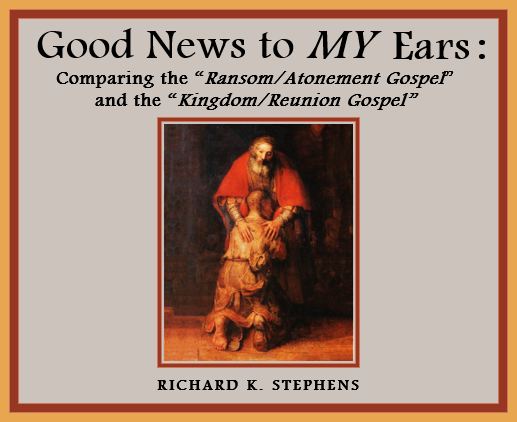Good News to MY Ears: Comparing the “Ransom/Atonement Gospel” and the “Kingdom/Reunion Gospel”
Good News to MY Ears: Comparing the “Ransom/Atonement Gospel” and the “Kingdom/Reunion Gospel”
***
Here are wonderfully clear descriptions of the two meanings of the term “the gospel” most frequently encountered. One is centered on the good news being forgiven of sins by grace and redemption though assenting to propositional truth claims—all of which is complete in the substitutionary atonement (paying for our sins through sacrificing himself) achieved through the cross (crucifixion, resurrection and ascension). I call this the “Ransom/Atonement Gospel.”
The other is centered on the promise of the Kingdom of God being at hand with Jesus’s coming and the necessity of repentance -- more properly “Metanoia,” a Greek word that resists translation, but which means the deliberate radical changing of one’s mind. I call this the “Kingdom/Reunion Gospel.”
It is the latter is the one the lays out what I believe is the primary, compelling Good News. A message which offers a requirement to develop character (making deliberate guided effort) in community that imitates Christ.
“Ransom/Atonement Gospel”
Still others have a practical theology that simply will not allow for spiritual growth. Indeed, they just might see it as a bad thing. Having been saved by grace, these individuals have become paralyzed by it. For them, any attempt to make progress forward in the spiritual life smacks of “works righteousness.” Since their liturgies tell them that they sin in word, thought, and deed daily, they have concluded that this is their fate until they die.
Heaven is their only release from this world of sin and rebellion. Hence these folk—good folk, well-meaning folk—will sit in the pew year after year without a millimeter of movement forward in the spiritual life.
[Richard J. Foster, Casting a Vision: The Past and Future of Spiritual Formation, Renovaré, 2019, p. 1]
“Kingdom/Reunion Gospel.”
I think the Gospel is the good news of the coming of the Kingdom of God. And the kingdom of God brings about Shalom. So, it's a really interesting question. Try this: go to your churches and ask people why did Jesus come to earth. In When Helping Hurts, the first chapter starts off – that's the title of the chapter: “Why did Jesus come to Earth?” – and what most of us most of our parishioners, or Brothers and Sisters in Christ, will say: “Jesus came to Earth to die on the cross to pay the penalty for my sins.” That is certainly true.
There is no question about that. I don't want to cast any doubt on that, at any level, but it's so interesting to me that the very start of Jesus’s earthly ministry he says he's come to preach the good news of the Kingdom of God, which is the coming of all of the goodness that God intends for his – all of his – creation.
It means the transformation of the cosmos into a new heavens and new Earth, where there is Shalom; where human beings once again enjoy all that it means to be human – which we argue is to live in right relationship with God, with ourselves, with others, and with creation. That's the good news of the Gospel is that the Kingdom has come in Christ. And it's still coming. And so, what are the implications of that for gospel proclamation, for preaching? That's the message. What bothers me is the church doesn't seem to know the message.
We don't have to pit these things against each other. Christ’s substitutionary atonement is necessary. It pays for the penalty for our sins, but then what? Well, it brings us into the very dwelling place of God, in which there is Shalom. And so, for me, the Gospel is the good news of the Kingdom. And our response is to repent and trust in Jesus, and grow into our new skin as new creatures in Christ.
[“When Helping Hurts With Brian Fikkert,” #MissionsPodcast, ABWE International, Nov 6, 2022, 38:48; @ 14:31-16:30; spoken words, edited for text presentation]
***



Comments
Post a Comment